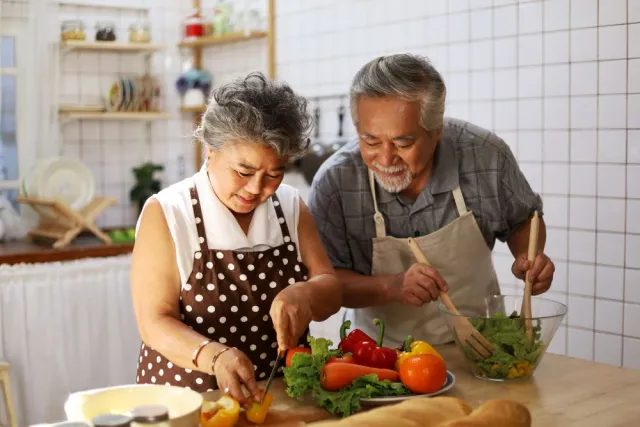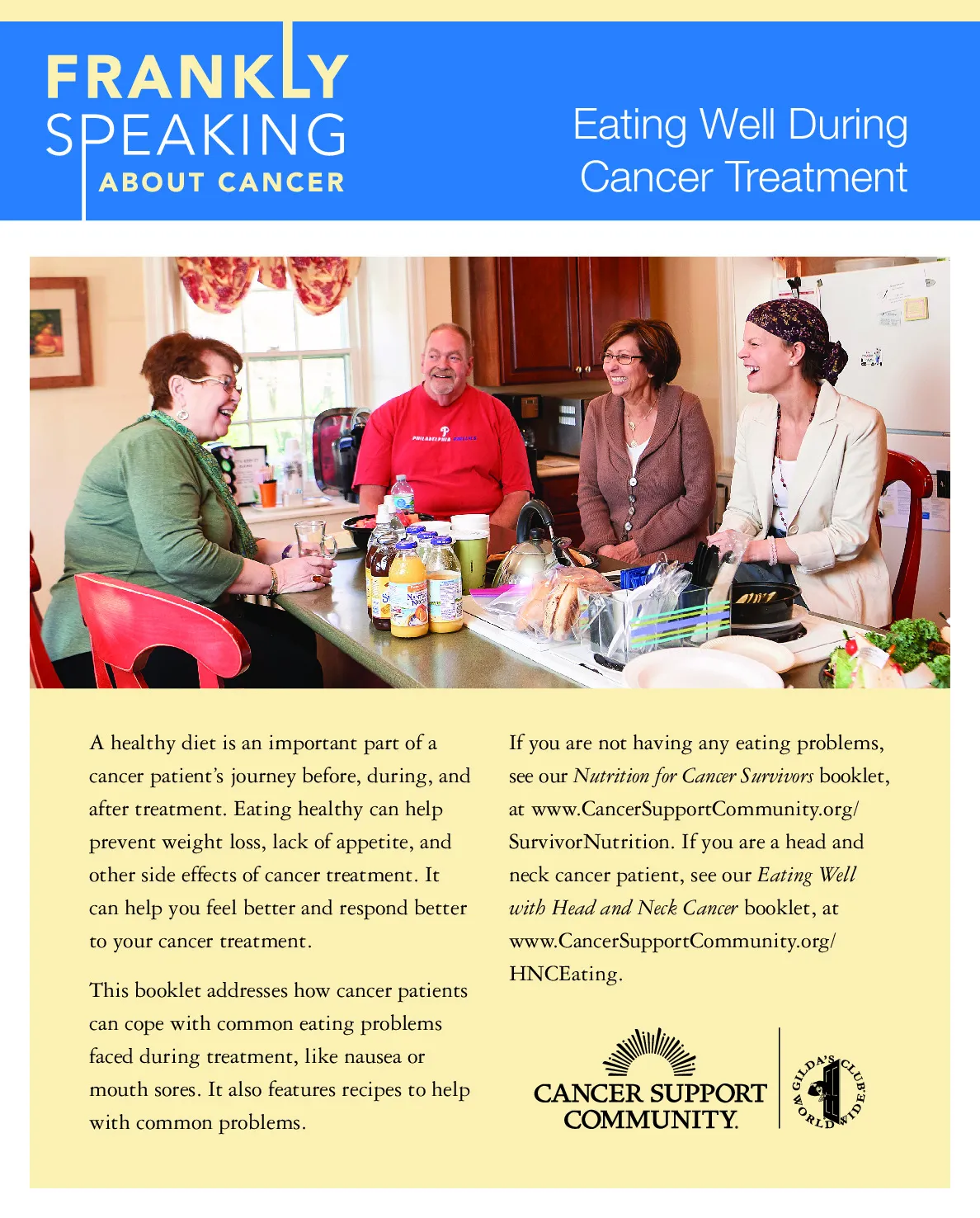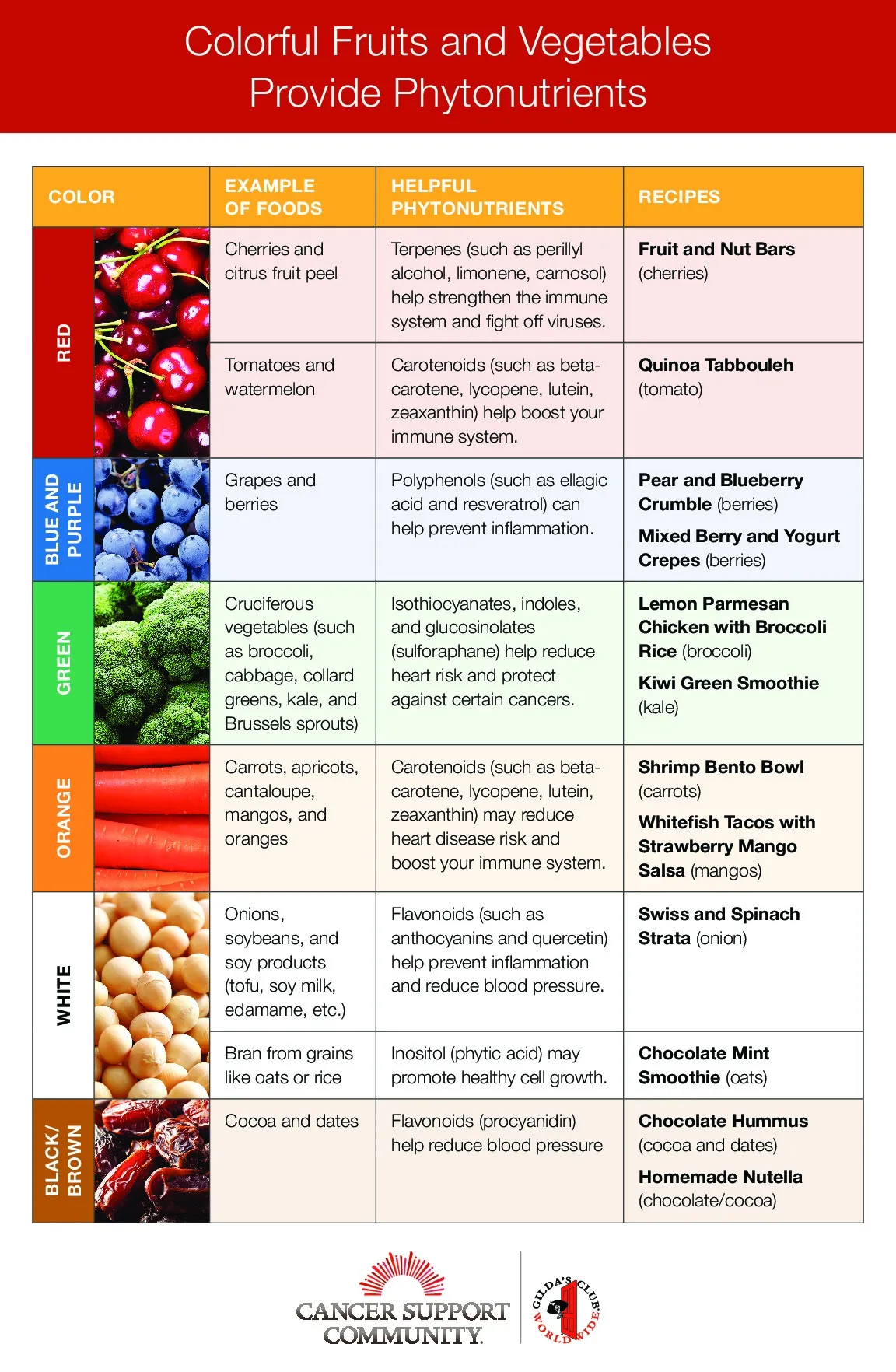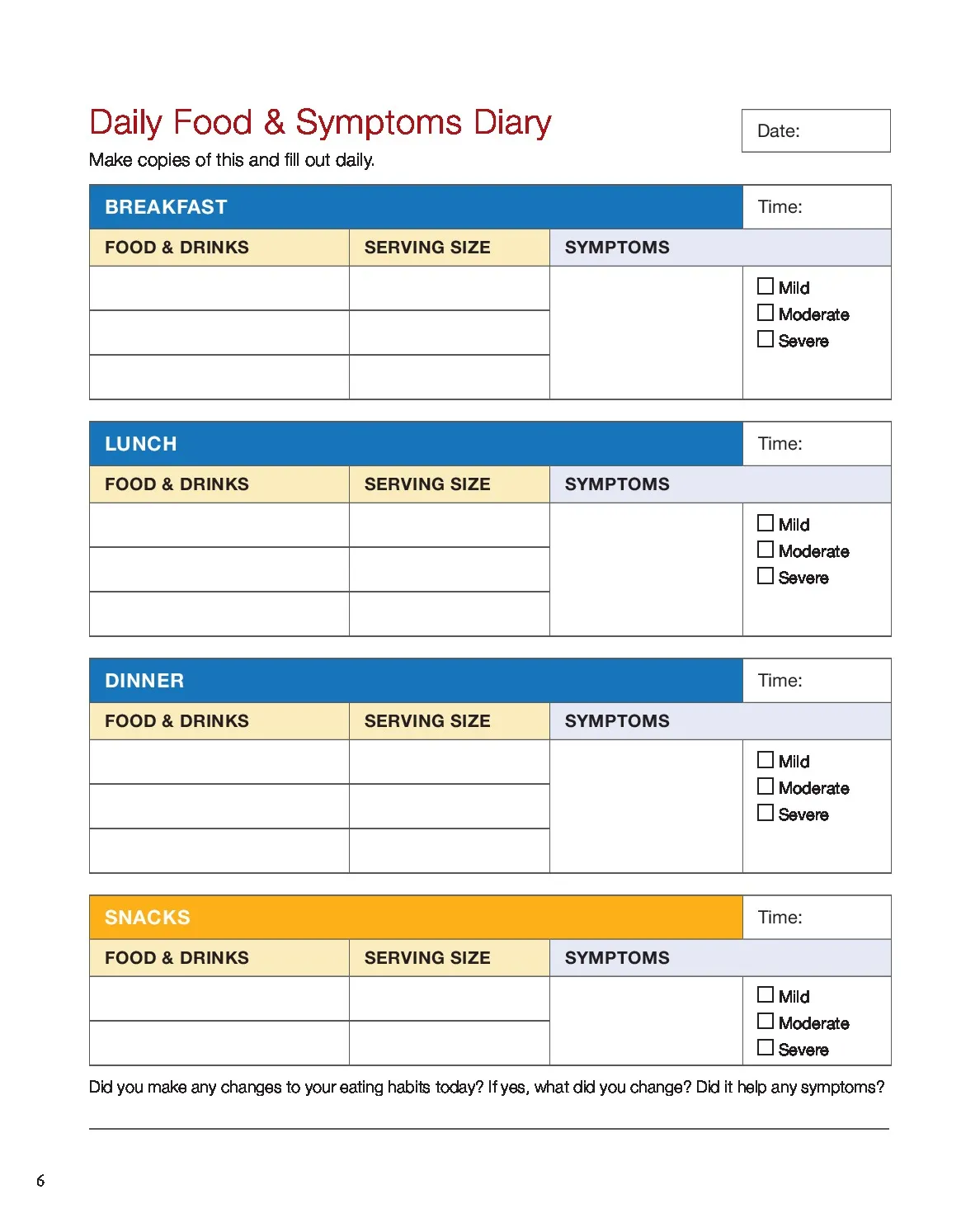Diet & Nutrition During Cancer Treatment
Let Us Personalize Your Visit. I am:
If you've already saved your personalized content, login.
Table of Contents

Nutrition & Cancer Treatment
A Healthy Diet Is Important at Each Step in the Cancer Journey
Eating problems like nausea or decreased appetite are common during cancer treatment. These problems can make it hard to feel well and eat healthy. Eating healthy can:
- Help with side effects like nausea, diarrhea, or taste changes.
- Help maintain body weight and muscle mass.
- Help give you more energy.
- Help prevent delays or breaks in treatment.
- Help prevent hospital stays or reduce the time you are in the hospital.
- Help improve how well you respond to treatment.
- Help improve how well treatment works.
Your Food Advocate: A Registered Oncology Dietitian
A registered dietitian (RD or RDN) is an expert on diet and nutrition. An RD who has the letters CSO after their name is a board-certified specialist in oncology nutrition. They have demonstrated experience and skills in helping cancer patients eat healthy and manage eating problems. It is important for cancer patients to visit with an oncology dietitian to develop a plan for a healthy diet. If there is not a CSO available where you are receiving treatment, ask for an RD with oncology experience.
Search for an oncology dietitian near you or ask your healthcare team to recommend one. Meeting with your oncology dietitian on a regular basis helps you cope with eating problems as they occur and stay healthy. For example, patients who get help from an RD are able to limit weight loss better than patients who don’t get help from an RD.

Nutrition Tips From an Expert
We spoke with an oncology dietitian about what people can do to eat healthy after a cancer diagnosis or treatment.
Food Safety During Treatment
It is important to handle food safely during cancer treatment. Cancer and cancer treatment can weaken your immune system and make you more prone to infection. This includes infection from foods. The following tips are helpful ways to keep your food safe.
- Wash your hands before eating.
- Keep surfaces that come into contact with food clean.
- Keep hot foods hot (above 140°F) and cold foods cold (below 40°F).
- Avoid cross-contaminating raw meats and vegetables. Store raw meat on the lowest shelf to avoid juices contaminating
- other foods.
- Wash raw fruits and vegetables well before eating.
- Avoid high risk foods like undercooked eggs, meat, poultry, fish, or shellfish and unpasteurized milk or cheese.
- Avoid high risk foods like sushi, ceviche, raw bean and alfalfa sprouts, foods from street vendors, and self-serve buffets.
- Thaw frozen meats in the refrigerator and not on the counter.
- Refrigerate foods promptly after eating.
- Your healthcare team may give you more specific instructions.
Coping With Eating Problems From Cancer Treatment
Cancer can be overwhelming. There are so many questions, issues, and concerns that can come up. It is important to talk to your healthcare team about your questions and concerns.
A way to be an active partner with your healthcare team is to keep a food and symptom journal. It will help you track what you eat and your side effects. Show this journal to your healthcare team often so they can address and manage any issues. It will help your team manage your treatment and recommend the healthiest diet for you.
Side effects like being tired or having nausea, diarrhea, or constipation are normal during treatment. Most often, these issues go away after treatment ends. We offer tips on how to cope with common eating problems caused by cancer treatment below.
Appetite Changes
Not Hungry or Feeling Full Too Quickly
If you don’t feel hungry or feel full too quickly:
- Eat 5-6 small meals throughout the day, instead of 3 big meals.
- Eat with friends or family or watch television while eating to take your mind off your lack of appetite.
- Keep an eating and drinking schedule and set an alarm to remind you to eat.
- Keep snacks next to you during chemotherapy or while in bed.
- Make mealtime as pleasant as possible. One idea is to set the table, use nice plates, and have flowers as a centerpiece.
Overeating or Feeling More Hungry Than Usual
If you have an increased appetite or feel more hungry than usual:
- Eat small, frequent meals throughout the day instead of 3 big meals.
- Limit high-calorie foods such as pizza, fried foods, foods made with cheese or cream, and desserts.
- Choose lower calorie foods like fresh fruits and vegetables, baked or grilled poultry and fish, and beans.
- Eat higher fiber foods such as whole grains, fruits, vegetables, nuts, and beans to help you feel more full.
- Include small portions of healthy fats from avocado (1⁄8 slice), nuts (¼ cup), or nut butters (2 tbsp) to help you feel more full.
- Be aware of the right portions. For example, a portion of meat is about the size of a deck of cards, a piece of fruit or a serving of vegetables is the size of a baseball, a serving of grains is the size of a light bulb, and a serving of nuts is the size of a golf ball.
- Drink a glass of water before meals to fill up and avoid overeating.

Share Recipes and Advice
Exchange healthy eating tips with others on our Nutrition & Wellness discussion board for people impacted by cancer.
Cancer Cachexia
Drastic unintentional loss of muscle mass and body weight, or loss of appetite, may be signs of a condition called cancer cachexia. It is estimated that cancer cachexia occurs in 50% of people with cancer.
Constipation & Diarrhea
Constipation
Food tips for constipation:
- Increase foods that can help promote a bowel movement:
- Choose high fiber foods, such as whole grains, fruits, vegetables, nuts, and beans.
- Try prunes and other dried fruits and juices, such as prune or apple juice.
- Drink hot beverages, such as herbal tea and decaffeinated coffee.
- Make sure you drink enough fluids.
- If you are having gas and bloating, stay away from “gassy” vegetables like cabbage, broccoli, cauliflower, peas, corn, and beans. Avoid drinking through a straw or chewing gum. These can also make gas and bloating worse.
Non-food tips for constipation:
- Move more if you are able — walk, stretch, or do yoga.
- Talk to your healthcare team about drugs or other tips that can help with constipation.
- Drink hydrating fluids with electrolytes, such as coconut water, broth, electrolyte drinks, and diluted fruit juices. Carry a water bottle to stay hydrated.
- Eat probiotics from food such as yogurt, kefir, and fermented foods. Talk to your healthcare team before taking any probiotic supplements.
To help with constipation, try these recipes:
- Baked Falafel with Ginger Tzatziki
- Cheesy Chicken Millet Bake
- Chicken Puttanesca over Zucchini Noodles
- Mango Lassi Overnight Oats
Diarrhea
Foods to AVOID when you have diarrhea:
- Alcohol and caffeinated drinks
- Dairy foods (other than cultured dairy like yogurt or kefir)
- Foods that are high in sugar, such as juices or sweets
- Greasy and fried foods
- High-fiber and bulky foods, such as raw vegetables, nuts, and whole grains
Foods to EAT when you have diarrhea:
- Apples (without skin) or applesauce
- Baked chicken, turkey, or fish
- Bananas
- Canned fruit (in juice), such as canned peaches or pears
- Oatmeal, barley, or cream of rice cereal
- Plain potatoes without skin
- White rice or pasta
- Fluids with electrolytes: coconut water, broth, and diluted fruit juices (carry a water bottle to drink often)
To help manage diarrhea, try these recipes:
Feeling Tired (Fatigue)
- Ask family and friends to help make meals and assist with other daily tasks.
- On days that you have more energy, cook soup or stews in bulk to have meals on hand.
- Increase your physical activity as best you can in order to help fight fatigue.
- Take it one day at a time and look at each day as a new day.
- Take breaks throughout the day.
- Try something you did not do yesterday and try not to let your lack of energy discourage you.
- Try not to overdo it on higher energy days, so you can conserve your energy.
Browse Our Recipe Gallery
Explore more nutritious recipes for breakfast, lunch, dinner, and snacks in our recipe gallery
Mouth & Throat Changes
Dry Mouth
Food tips for dry mouth:
- Avoid alcohol and limit caffeinated drinks.
- Increase your saliva by:
- Sucking on sugar-free tart candies prior to eating
- Chewing on sugar-free gum in between meals
- Moistening foods with sauces and gravies
- If acidic foods don’t irritate your mouth or throat, you can also try:
- Adding lemon or lime to water
- Using citrus fruits or juices in marinades or dressings
- Limit dry or hard-to-swallow foods, such as baked potatoes, peanut butter, tough meat, and “doughy” bread.
- Make sure you drink enough fluids to prevent dehydration. Carry a water bottle with you to stay hydrated.
Non-food tips for dry mouth:
- Apply lip balm or petroleum jelly to protect your lips.
- Sleep with a humidifier in your room to help moisten your mouth at night. Be sure to clean the humidifier regularly.
- Use alcohol-free mouthwash daily and/or saliva substitutes.
To help with dry mouth, try these moist recipes:
- Cheesy Chicken Millet Bake
- Chicken Puttanesca over Zucchini Noodles
- Golden Milk Popsicles
- Turkey and Barley Vegetable Soup
Changes in Taste and Smell
Foods may taste or smell different every day. You may find it helpful to keep trying different foods to find what appeals to you.
If everything tastes bland or has no taste:
- Add stronger flavors onto foods. Pickles, condiments, sauces, dressings, vinegar, or citrus juices may help. (You may need to avoid these if you have mouth or throat sores).
- Add spices and seasonings to enhance the flavor of your food.
- Marinate meats for a stronger flavor.
- Suck on sugar-free tart candies before or after a meal.
- Clean your mouth with homemade baking soda rinse.
If everything tastes metallic or bitter:
- Add sweeteners such as honey or pure maple syrup onto foods to offset the bitter taste.
- Choose other protein sources (such as fish, chicken, or beans) if red meat tastes metallic.
- Use plastic utensils instead of silverware.
- Avoid cooking on iron skillets.
If the smell of food makes you not want to eat:
- Avoid being in the kitchen when food is being made.
- Choose cold or room-temperature foods instead of hot foods, which can smell stronger.
- Light a scented candle or essential oil diffuser to remove unpleasant or offensive odors.
- Open a window or turn on a fan to minimize the smells.
If you are having trouble with changes in taste and smells, try these recipes:
- Apple Cinnamon Muffins
- Baked Falafel with Ginger Tzatziki
- Cauliflower Burgers
- Cheesy Chicken Millet Bake
- Chicken Puttanesca over Zucchini
- Golden Milk Popsicles
- Mango Lassi Overnight Oats
- Turkey and Barley Vegetable Soup
Mouth Sores and Mouth Pain
Food tips for mouth sores and mouth pain:
- Choose foods that help soothe the mouth, including:
- Cold foods, such as popsicles, frozen fruit, and ice cream
- Soft, mild foods, such as cottage cheese, smoothies, and yogurt
- Well-cooked, soft meals such as potatoes, macaroni and cheese, casseroles, stews, and ground meats
- Avoid foods that could irritate the mouth, including:
- Acidic or spicy foods, such as citrus fruits, tomatoes, peppers, and vinegar
- Alcohol and carbonated drinks
- Crunchy or hard foods, such as crusty bread, pretzels, and chips
- Hot foods; choose room-temperature or cold foods instead
Non-food tips for mouth sores and mouth pain:
- Drink through a straw to avoid sore spots.
- Suck on ice chips when you have mouth pain.
- Use a baking soda rinse before and after meals.
To help with mouth pain, try these soft, easy-to-chew, and mild recipes:
Problems Chewing or Swallowing
Choose foods that are easier to chew and swallow. These can include:
- Soft foods, such as scrambled eggs, oatmeal, soft pasta, potatoes, soups, and stews.
- Softer protein sources such as fish, ground meats, eggs, beans, and creamy nut butters.
- High calorie drinks, such as smoothies, milkshakes, or nutritional supplements. (Be sure to discuss all nutritional supplements with your healthcare team first.)
Stay away from foods that could cause chewing or swallowing pain:
- Hard foods, such as crackers, crusty breads, raw vegetables, and crunchy cereals.
- Tough meats, such as steak, pork chops, turkey, or chicken breast.
- Acidic foods such as tomatoes and citrus fruits.
Make foods easier to chew and swallow by:
- Adding dressing, sauces, or gravy to meats and other dishes.
- Pureeing foods in the blender.
- Thickening foods as needed with cornstarch, baby cereal, potato flakes, gelatin, or commercial thickeners.
If you have trouble opening and closing your mouth to chew foods, talk to your healthcare team. You may need to meet with your physical therapist for exercises to help you. If you regularly cough or bring food back up after eating, be sure to tell your healthcare team. You may need to meet with a speech-language pathologist to assess how well you swallow.
If you have difficulty chewing or swallowing, try these recipes:
Side Effects of Cancer Treatment: Changing Taste of Food
Caregivers and patients share how the side effects of cancer treatment can change the taste of food.
Nausea & Vomiting
Food tips for nausea or vomiting:
- Even though you do not feel like eating, an empty stomach can make nausea worse. Aim to eat a small amount of food every 1-2 hours to prevent nausea.
- Choose bland foods, such as plain pasta or rice. If dry mouth isn’t a problem, you can also try dry food such as crackers and pretzels.
- Choose room temperature or cold foods instead of hot entrees.
- Drink ginger tea or chew ginger candies when you feel nauseated.
- Drink hydrating fluids (such as water, 100% juice, coconut water, or chamomile or ginger tea) throughout the day to prevent dehydration.
- Limit your intake of fried, greasy, or “heavy” foods, as these can make nausea worse.
Non-food tips for nausea or vomiting:
- If drugs or supplements make you nauseous, talk to your healthcare team about taking them with food, instead of on an empty stomach.
- Talk to your health care team about anti-nausea drugs. For the most benefit, take anti-nausea drugs 30-45 minutes prior to a meal. You may also need to take them around the clock, instead of as needed.
- Try deep breathing, meditation, or guided imagery to help settle your stomach and mind. Visit our Mind Body Studio for yoga lessons, gentle exercises, and meditation videos.
To help with nausea, try these recipes:
Coping with Nausea and Vomiting
Weight Changes
Weight Loss
It is important to prevent weight loss during cancer treatment. To prevent weight loss and add calories to your diet:
- Add healthy high-calorie additives to the foods you eat regularly, such as:
- Avocado
- Olive oil or butter
- Nuts and seeds
- Cheese
- Sauces and gravies
- Dried fruit
- Peanut butter, almond butter, or other nut butters
- Aim to eat 5-6 small meals daily, instead of 3 big meals.
- Include high-calorie smoothies or nutritional drinks to your daily routine.
- Include high-protein foods to help your body heal and prevent further muscle mass loss:
- Nuts, seeds, and nut butters
- Beans
- Meat
- Fish
- Poultry
- Eggs
- Dairy products
- Talk to your healthcare team about physical therapy if you feel weak or unable to maintain your daily routine.
To help with adding calories, try these recipes:
- Avocado Macaroni and Cheese
- Golden Milk Popsicles
- Mango Lassi Overnight Oats
- Turkey and Barley Vegetable Soup
Weight Gain
Some patients experience weight gain during or after cancer treatment. It can be related to many factors. These can include appetite changes, decreased activity, hormonal treatment, steroids, and for women whether or not they’ve reached menopause. Managing weight gain is all about choosing a healthier lifestyle by eating healthy foods and exercising within your ability.
Choose healthier foods:
- Avoid higher calorie foods made with rich creamy sauces, cheese, oils, and fried foods.
- Fill up more of your plate with lower calorie fruits, non-starchy vegetables, and high-fiber whole grains.
- Choose baked or broiled fish and lean meats like skinless chicken and turkey breast over high-fat meats like hamburgers, steak, pork, and roasts.
Keep a food journal and meal plan:
- Planning ahead and tracking what you eat can help you stick with your goals.
- Identify parts of your diet that can be improved and set goals to work on them.
Avoid empty calories:
- Avoid high-calorie sugar-sweetened beverages, baked goods, and processed foods which offer little or no nutrition benefit.
- Choose beverages like water, seltzer, and plain tea. Flavor them with your favorite fruits.
Include more physical activity:
- Aim for at least 150 minutes of moderate physical activity per week.
- Find a friend to stay active with you.
- If you are able, consider including cardio, stretching, and resistance training to help maintain or increase your muscle mass.
Frankly Speaking About Cancer Library
LibraryWould you like a print copy of these educational materials?
We can mail our Frankly Speaking About Cancer pieces to you. Shipping is free for up to 20 pounds.


